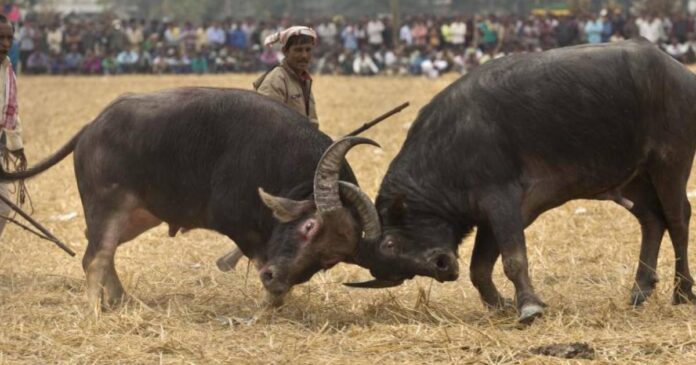The High Court has sought a response from the Assam government regarding unauthorized buffalo fights. The court’s action comes in response to a petition filed by animal rights activists seeking to ban the cruel practice.
Buffalo fights, locally known as ‘Melekoru,’ are a traditional event held during the Magh Bihu festival in Assam. However, these fights have drawn criticism from animal welfare organizations due to concerns about animal cruelty and violations of animal rights laws.
The petitioners argue that buffalo fights involve the intentional provocation and exploitation of animals for human entertainment, resulting in unnecessary suffering and harm. They contend that such practices are in violation of the Prevention of Cruelty to Animals Act, 1960, and other relevant legislation aimed at protecting animal welfare.
The High Court has taken cognizance of the matter and has directed the Assam government to respond to the allegations raised in the petition. The court’s decision reflects growing public concern over the ethical implications of traditional practices that inflict harm on animals.
Animal rights activists have long been advocating for the abolition of buffalo fights and other similar events that exploit animals for human amusement. They argue that such practices have no place in a modern society that values compassion and respect for all living beings.
The Assam government’s response to the court’s directive will be crucial in determining the future of buffalo fights in the state. The government must weigh the cultural significance of these events against the ethical considerations and legal obligations regarding animal welfare.
While some argue that buffalo fights are an integral part of Assamese culture and tradition, others contend that cultural practices should not come at the expense of animal suffering. The debate underscores the complex relationship between tradition, culture, and ethics in contemporary society.
In recent years, there has been a growing awareness and acceptance of the need to protect animal rights and promote animal welfare. Several states in India have banned or regulated cruel practices such as bullfighting and cockfighting, recognizing the inherent cruelty involved in such activities.
The High Court’s intervention in the case of unauthorized buffalo fights in Assam reflects a broader trend towards recognizing and addressing issues related to animal welfare and rights. It sends a strong message that the exploitation and mistreatment of animals will not be tolerated under the law.
As the legal proceedings discloses, it is hoped that the Assam government will take proactive measures to address the concerns raised by animal rights activists and ensure the welfare and protection of animals in the state. The outcome of the case will have far-reaching implications for the future of traditional practices involving animals and the broader movement towards promoting compassion and respect for all living beings.




